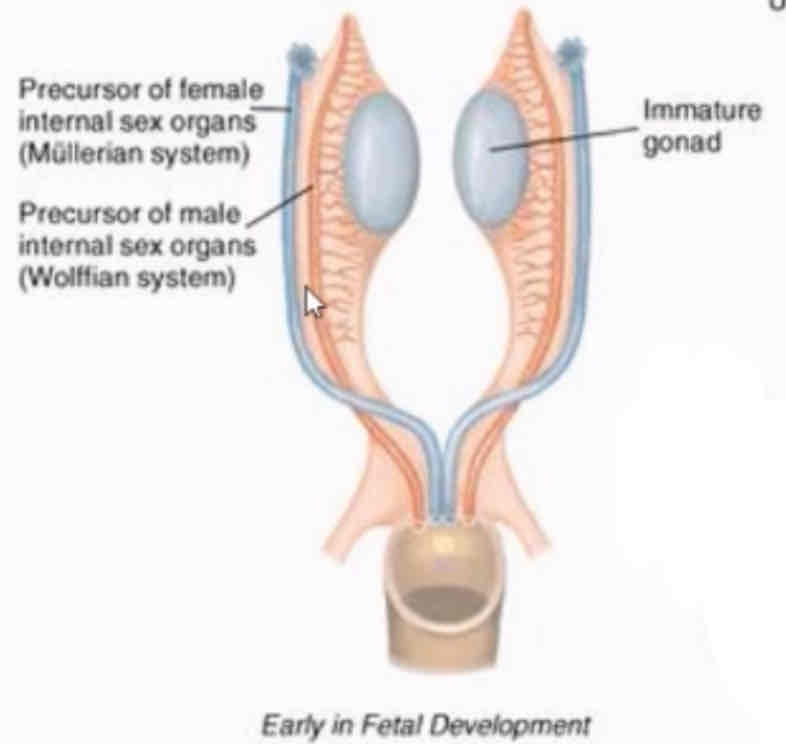Lec1 and 2. Sex differences
1/18
There's no tags or description
Looks like no tags are added yet.
Name | Mastery | Learn | Test | Matching | Spaced |
|---|
No study sessions yet.
19 Terms
Gametes
reproductive cells - haploid (only one set of chromosomes rather than two matching chromosomes)
Becomes XX or XY which determines sex of baby
Presence or absence of Y chromosome determines baby’s chromosomal sex.
Gene SRY - where is it located and what does it do
Located on Y chromosome
Turns the fetal gonad into a testis
- > Testis determining factor
In its absence, the gonad becomes an ovary
Very early start in determining if male or female.
Which two hormones does the testis make?
- Androgens (masculine) e.g. Testosterone
- Anti mullerian hormone (defeminising) – responsible for getting rid of the mullerian system
What is the mullerian and wolfian system
Mullerian system – precursor of female internal sex organs (represented by blue in diagram)
Wolfian system – precursor of male internal sex organs (represented by red in diagram)

What is DHT (dihydrotestosterone)
A specific type of androgen made by testis
In 7th/8th week of development, when the gonad has turned into a testes or ovary, the external genitalia are sensitive to androgens.
Is required to turn external anatomy into male specific anatomy
If not there/ can’t do job, we get development of female specific anatomy
A person with persistent Müllerian duct syndrome
Male external genitalia, with testes, male and female internal genitalia
They have XY chromosomes, wolfian system is working normally, they make androgens.
But anti mullerian hormone isn’t working so they end up with internal testes etc and fallopian tubes/uterus etc. with male development alongside it.
The external genitalia of a person with androgen insensitivity syndrome are:
Female
Person who is insensitive to androgens. They might make them but no receptors for them to bind to.
Two types of actions of hormones
Organisational and activational
Organisational action of hormones
Effect remains even after hormone has been removed. Often occurs during a sensitive period.
Activational action of hormones
Effect is reversible, depending on presence or absence of hormone. This is when we get to puberty.
Puberty - what gonads do
During childhood, gonads not making any hormones.
In teenage years they begin to make hormones which is known as puberty – sexual maturation.
These are secondary sexual characters
What are 3 characteristics of organisational hormonal effects
- Wider pelvis in women
- Wider shoulders in men
- Lowering of the voice in men
What are GnRH neurons
Gonadotropin releasing hormones
These neurons normally trigger a cascade of sex hormones e.g. testosterone etc
Not released during childhood due to being inhibited by GABA/ NPY neurons. (neurotransmitters)
What do the GABA/NPY neurons do in childhood and what does this mean for GnRH
GABA/NPY neurons are very active during childhood meaning the KNDy(kisspeptin) neurons are not active and not firing action potentials, therefore GnRH is not being stimulated.
What changes with the KNDy neurons at puberty
At some point during puberty, we get activation of the KNDy (kisspeptin) neurons and the GABA/NPY is now inhibited. So the GnRH neurons are now being stimulated.
How often is the GnRH hormone released into bloodstream
In pulses approx every 2hrs
What happens when GnRH are released
GnRH released into blood vessels which is known as the pituitary portal system.
This then immediately goes into the anterior pituitary gland, where there are other cells that have receptors for GnRH, which when detected, make their own hormones.
What are the hormones that are released after GnRH
These are called gonadotropins (hormones that go to the gonads)
These in turn, make the testis produce testosterone / ovary produce estradiol.
What are the two types of gonadotropins
FSH – follicle stimulating hormone
LH – luteinising hormone